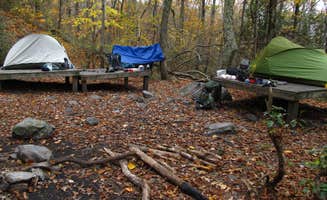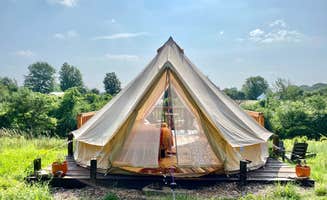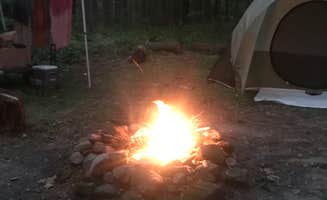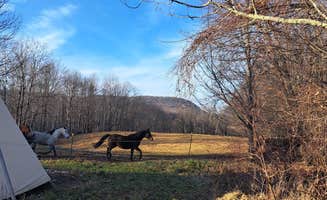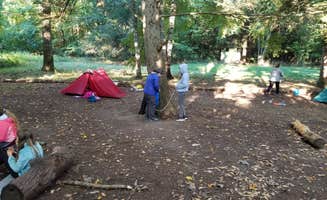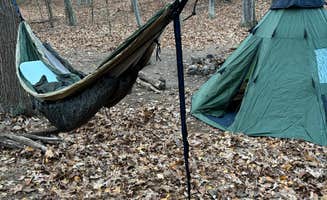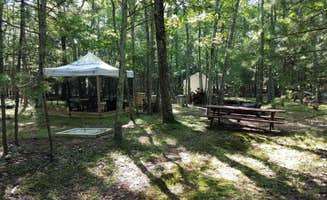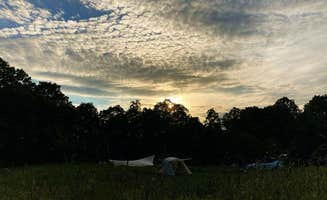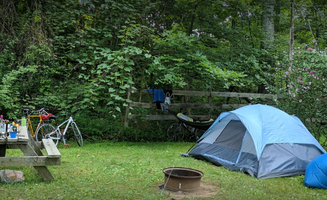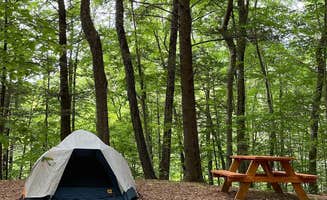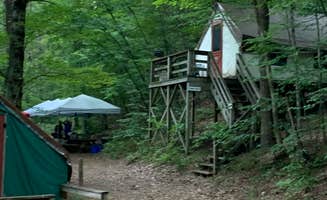Tent camping near South Egremont, Massachusetts centers around the southern Berkshire Mountains, with elevations reaching approximately 2,600 feet at Mount Everett. The region experiences warm summer days with average highs in the mid-70s, often dropping 15-20 degrees at night even in July and August. Many wilderness sites require significant uphill hiking with full gear across rocky, root-covered trails through dense hardwood forests.
What to do
Explore waterfalls on trail routes: Race Brook Falls offers a scenic stop when accessing camping areas around Mount Everett. "On the way up you will see signs for Race Brook Falls; its pretty beautiful and worth a day hike if you aren't camping or whatnot," notes Tina D. about her hike to Laurel Ridge.
Summit local peaks: Bear Mountain provides excellent views for campers willing to make the climb. "Make sure to hit the summit of Bear Mountain; incredible view!" recommends Nora S. about camping at Riga Lean-To.
Overnight sections of the Appalachian Trail: Connect multiple shelter sites for a multi-day backpacking experience. "We ended up stumbling on this campsite on our way to the Riga lean-to, which was a very happy surprise," shares Nora about Brassie Brook Shelter, noting "We had a phenomenal time, and definitely recommend!"
What campers like
Solitude and privacy: Many sites require physical effort to reach, naturally limiting crowds. "We ended up finding a very primitive spot off the blue trail (on top of the mountain), where we settled down for the night," explains Nora S. about Onion Mountain Park, adding "The spot is not very big so make sure to bring a smaller tent."
Clean facilities despite remote locations: Many backcountry sites maintain surprisingly good amenities. "Although we were the only campers at the time the area was emmaculate and not one piece of trash on the ground anywhere! The outhouse was even clean!" reports Liz P. about Alander Trail Campground.
Fall colors and cooler temperatures: Autumn brings dramatic foliage but requires warmer gear. "The fall views made it worth it. We did have some sun spots at least throughout the trip," writes Tina D. about Brassie Brook, noting their trip was "cut short because we were freezing and it was raining."
What you should know
Challenging terrain requires preparation: Most backcountry sites involve significant climbing. "Be prepared for steep inclines, and lots of rocks," warns Nora S. about accessing Brassie Brook Shelter, adding "After about a mile, you reach a trail intersection, stay left and continue up the hill."
Wildlife precautions are essential: Bear boxes are available at some sites but not all. "We did put a bear bag about 100 feet away," explains Nora S. at Onion Mountain Park, while Kay D. notes about Alander Trail Campground, "We had some scares with coyotes and bears in the past but never anything crazy."
Water sources and filtration: Plan water needs carefully as most sites lack potable water. At Echo Lake, James A. warns, "Lake is surrounded by hills and there is a small lean two with a few campfire spots," but notes "it can get swampy near the edge of the lake so you may want to bring bug spray."
Tips for camping with families
Consider distance when planning: Choose sites based on children's hiking abilities. "It's quite a hike to get to this dispersed campground, so be prepared! We packed on our backpacks early in the morning and arrived there mid-afternoon," advises Nora S. about Laurel Ridge.
Unique alternative to traditional camping: For families wanting an unusual experience without backcountry challenges, consider railway accommodations. "It is a really fun place to spend a night, especially for a train enthusiast. The caboose is stationed on a big grassy field, near a real railroad. It sleeps 4 and you can set up tents outside too," explains Esther L. about Chester Railway Station.
Fire rules vary by location: Check regulations before promising campfires to children. "No fires allowed, however," notes Nora S. about Laurel Ridge, while at Onion Mountain Park camping areas have "a firepit already set up. We set up the tent and started a fire (very easy as there are sticks and wood everywhere)."
Tips from RVers
No RV access to wilderness sites: The backcountry camping options near South Egremont are exclusively tent camping with hike-in access. RVs and trailers cannot reach these wilderness sites, which typically require 1.5-2 miles of hiking with significant elevation changes.
Modern alternatives nearby: RV campers seeking amenities can find limited options within driving distance. "Each site has a private bathroom and hot shower, as well as a kitchenette," notes Ashley F. about the more developed Getaway Catskill Campground across the state line in New York.


